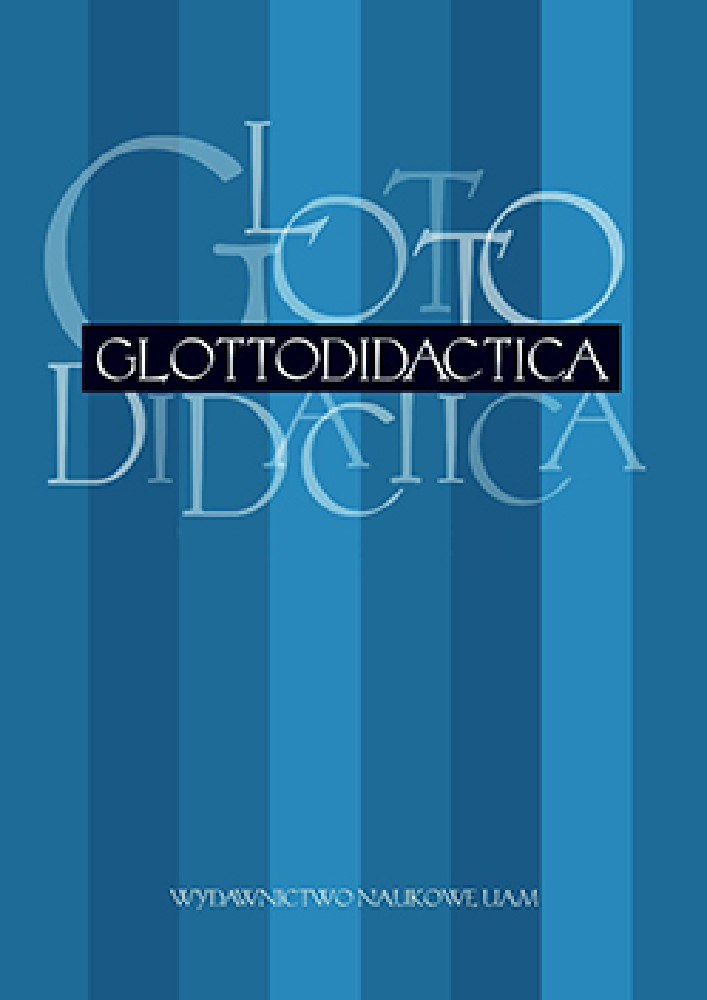Résumé
This paper attempts to highlight the significant multidimensional role of teachers of English as a foreign language in conducting language assessment in the process of teaching. The study presented in the article aimed to investigate school and university EFL teachers’ (n=87) beliefs about the place of assessment in their teaching practice and their role as assessors. The findings indicated that classroom assessment, though appreciated by the study participants, posed a major challenge to them.Références
Bachman, L. F., 2008. Language assessment: opportunities and challenges. Retrieved from the Web Oct 27, 2008, <http://www.aaal.org/index.php?id=48>.
Black, P., 2009. Formative assessment issues across the curriculum: the theory and the practice. In: TESOL Quarterly 43/3, 519–524.
Brown, H.D., 2004. Language Assessment. Principles and Classroom Practices. New York: Pearson Education.
Bullock, D., 2011. Learner self-assessment: an investigation into teachers’ beliefs. In: ELT Journal 65/2, 114–125.
Cheng, L., Rodgers, T., Hu, H., 2004. ESL/EFL instructors’ classroom assessment practices: purposes, methods, and procedures. In: Language Testing 21/3, 360–389.
Cumming, A., 2009. Language assessment in education: tests, curricula, and teaching. In: Annual Review of Applied Linguistics 29, 90–100.
Czetwertyńska, G., 2005. Konstruktywizm a ocenianie kształtujące. In: Języki Obce w Szkole 6/2005, 16–19.
Davison, C., Leung C., 2009. Current Issues in English Language Teacher-Based Assessment. In: TESOL Quarterly 43/3, 393–415.
Falsgraf, C., 2009. The ecology of assessment. In: Language Teaching 42/4, 491–503.
Fulcher, G., Davidson, F., 2007. Language Testing and Assessment: An Advanced Resource Book. New York: Routledge.
Genesee, F., Upshur, J.A., 1996. Classroom-based evaluation in second language education. New York: Cambridge University Press.
Komorowska, H., 2002. Sprawdzanie umiejętności w nauce języka obcego: kontrola, ocena, testowanie. Warszawa: Fraszka Edukacyjna.
Lantolf, J.P., 2009. Dynamic assessment: The dialectic integration of instruction and assessment. In: Language Teaching 42/3, 355–368.
Leung, C., 2005. Classroom teacher assessment of second language development: construct as practice. In: Hinkel, E. (ed.). Handbook of research in second language learning and teaching. Mahwah, NJ: Lawrence Earlbaum, 869–888.
Leung, C., Lewkowicz, J., 2006. Expanding Horizons and Unresolved Conundrums: Language Testing and Assessment. In: TESOL Quarterly 40/1, 211–234.
Llosa, L., 2011. Standards-based classroom assessments of English proficiency: A review of issues, current developments, and future directions for research. In: Language Testing 28/3, 367–382.
McNamara, T., Roeven, C., 2006. Language testing: the social dimension. Oxford: Blackwell Publishing.
Mok, J., 2011. A case study of students’ perceptions of peer assessment in Hong Kong. In: ELT Journal 65/3, 230–239.
Piegzik, W., 2005. Ocenianie osiągnięć uczniowskich na lekcjach języków obcych. In: Języki Obce w Szkole 6/2005, 75–83.
Poehner, M.E., 2009. Group dynamic assessment: mediation for the L2 classroom. In: TESOL Quarterly 43/3, 471–491.
Rea-Dickins, P., 2004. Understanding teachers as agents of assessment. In: Language Testing 21/3, 249–258.
Rea-Dickins, P., 2006. Currents and eddies in the discourse on assessment: a learning-focused interpretation. In: International Journal of Applied Linguistics 16/2, 163–188.
Shohamy, E., Inbar, O., 2006. Assessment of advanced language proficiency: Why performance-based tasks? (CALPER Professional Development Document 0605). University Park, PA: The Pennsylvania State University, Center for Advanced Language Proficiency Education and Research.
Shohamy, E., Inbar-Lourie, O., Poehner, M., 2008. Investigating assessment perceptions and practices in the advanced foreign language classroom (Report No. 1108). University Park, PA: Center for Advanced Language Proficiency Education and Research.
Zawadzka, E., 2004. Nauczyciele języków obcych w dobie przemian. Kraków: Oficyna Wydawnicza „Impuls”.
Licence
Auteurs
Les auteurs de textes acceptés pour publication dans la revue Glottodidactica sont tenus de remplir, signer et renvoyer à l'adresse de la rédaction, un accord sur l'octroi d'une licence gratuite pour les œuvres, avec obligation d'accorder une sous-licence CC.
Conformément à cet accord, les auteurs des textes publiés dans la revue Glottodidactica accordent à l'Université Adam Mickiewicz de Poznań une licence non exclusive et gratuite et autorisent l'utilisation de la sous-licence Creative Commons Attribution-NoDerivatives 4.0 International (CC BY-ND 4.0).
Les auteurs se réservent le droit de disposer librement de l'œuvre.
Utilisateurs
Les utilisateurs d'Internet intéressés ont le droit d'utiliser les œuvres publiées dans la revue Glottodidactica depuis 2016, selon les conditions suivantes :
- Attribution – obligation de fournir, conjointement avec l'œuvre distribuée, des informations sur l'auteur, le titre, la source (lien vers l'œuvre originale, DOI) et la licence elle-même.
- Aucune modification – l'œuvre doit être préservée dans sa forme originale. Sans le consentement de l'auteur, il n'est pas possible de distribuer l'œuvre modifiée sous forme de traductions, publications, etc.
Les droits d'auteur sont réservés pour tous les textes publiés avant 2016.
Autres
L'Université Adam Mickiewicz de Poznań conserve les droits sur la revue dans son ensemble (mise en page, forme graphique, titre, conception de la couverture, logo, etc.).
A PARTIR DE L’ANNEE 2015, LES ARTICLES PUBLIÉS DANS LA REVUE SONT DISPONIBLES SOUS LICENCE CREATIVE COMMONS : https://creativecommons.org/licenses/by-nd/4.0/deed.fr




